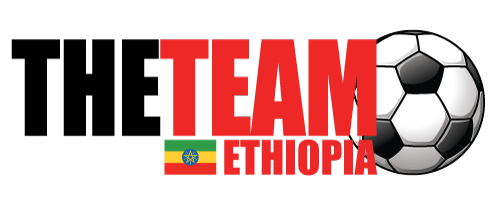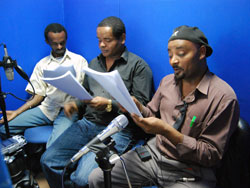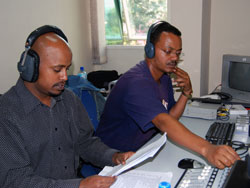
 The Team in Ethiopia – known locally as Tena Budin – aimed to enable Ethiopians to look collectively at community problems and work collaboratively to find non-violent solutions to conflicts. The 50-episode radio drama was broadcast on Radio Fana, nationwide, from July 2009 through July 2010. The topics and issues covered were chosen to especially appeal to, and be meaningful for, youth. The Team in Ethiopia – known locally as Tena Budin – aimed to enable Ethiopians to look collectively at community problems and work collaboratively to find non-violent solutions to conflicts. The 50-episode radio drama was broadcast on Radio Fana, nationwide, from July 2009 through July 2010. The topics and issues covered were chosen to especially appeal to, and be meaningful for, youth.
The series revolved around members of a soccer/football* team, following the emerging love story between two of the main characters and the many problems they confront. They are shown working through these conflicts constructively, becoming role models for other young people. The series, created by PACT Ethiopia and Search for Common Ground (SFCG), focused on promoting a change of attitude among Ethiopians regarding how to manage and resolve various community conflicts, while at the same time providing entertainment. It was co-produced by SFCG and the Ethiopian Zeleman Productions (http://www.zelemanproduction.com/).
 The Team tackled issues of ethnicity, religion, and class, and focused on themes of violence, dialogue, tolerance, mutual respect, social responsibility, and empowerment. The program served as a launching point for Ethiopians as a whole – and youth in particular – to discuss issues of diversity and interpersonal conflict. The Team tackled issues of ethnicity, religion, and class, and focused on themes of violence, dialogue, tolerance, mutual respect, social responsibility, and empowerment. The program served as a launching point for Ethiopians as a whole – and youth in particular – to discuss issues of diversity and interpersonal conflict.
In an evaluation attitude survey based on the first 10 episodes of The Team in Ethiopia, youth highlighted several topics in the series that were relevant to their lives. The following were among the issues identified:
Resolution of Conflict Between Groups
Participants said the various conflicts presented in the episodes related to their own lives since such conflicts and disagreements are common on football fields and elsewhere. They also said the ways different conflicts were resolved, using open discussion to reach mutual understanding, were very helpful.
Cooperation and Collective Responsibility
Participants said they learned from the series that they can solve many common problems in their community through cooperation and collective responsibility. This message was successfully communicated through portraying activities like speaking out against illegal acts, cleaning up the environment, and turning in a thief.
Women’s Empowerment and Gender Equality
In the series, women are portrayed in key leadership positions and as effective and efficient decision makers. Participants characterized them as understanding problems in the community and acting cooperatively to find solutions. Participants in the survey also said that the series showed them women can be as successful as men if they work as hard, citing the success of Aresema – the lead female character – on the football field.
Strength and Rejection of Abuse
The participants revealed that sexual harassment by instructors is one of the major problems affecting many female students. Aresema’s confidence and strength in handling the sexual harassment she encountered was recognized as a good lesson for female students who are at risk of similar harmful and unethical practices in schools and universities.
* The sport known as soccer in the United States will hereafter be referred to as football, as it is known in the rest of the world.
QUOTES FROM SURVEY PARTICIPANTS:
“Normally, in our day-to-day life, we do not see people trying to solve their differences in
a peaceful manner… [In the drama] we see that no matter what differences exist between
different groups, if the parties are willing to discuss their differences, there is a possibility
of finding a solution that satisfies all of the conflicting parties.”
--A female in the 15-24 age group, in Bahirdar
“What makes this drama special is that it raises many issues and it also gives possible
solutions.” --Another participant, unidentified by gender or age
Episode Summaries for The Team - Ethiopia (Season 1)
The Team has received funding from the following:
    


|